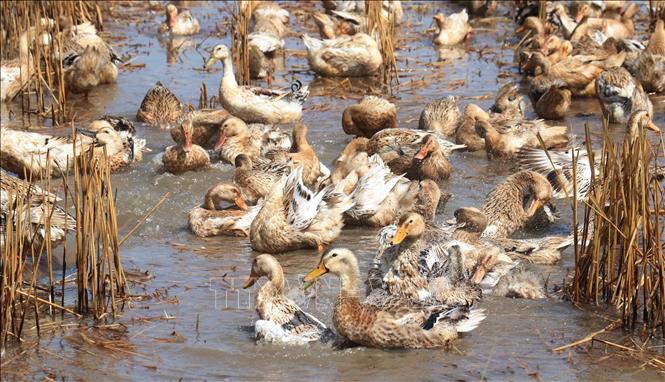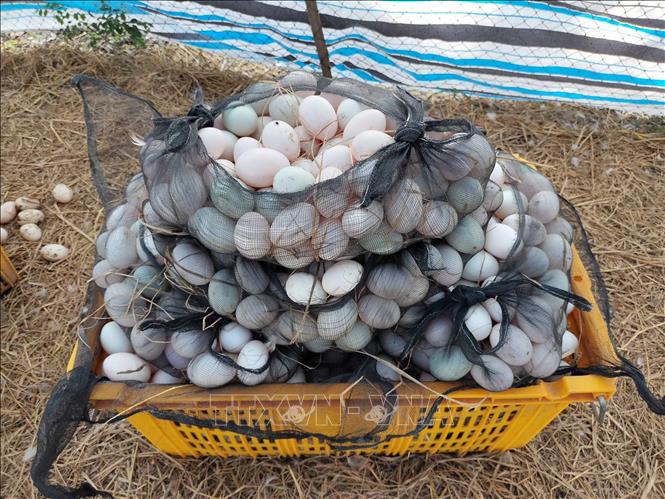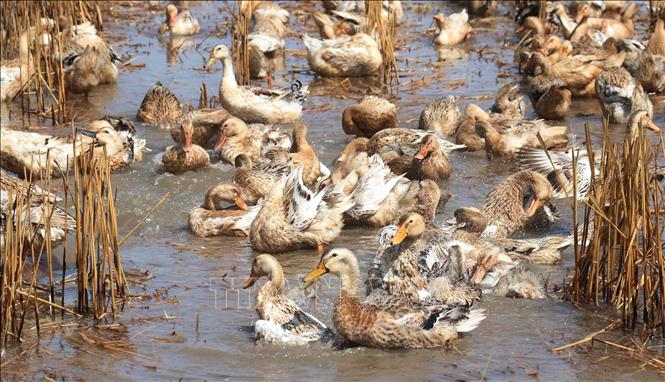
Free-range ducks in Tan My commune, Thanh Binh district, Dong Thap province. Photo: Nguyen Van Tri/VNA
Dong Thap province has designated Thap Muoi and Tam Nong districts as specialized egg-producing duck farming areas. Local duck breeds are mostly free-range, accounting for over 90%. These are specialized egg-laying breeds, with each egg currently selling for 2,200 – 3,000 VND, leaving a profit of 500 – 900 VND per egg for farmers.
Mr. Nguyen Chi Tam in Tan Phu commune, Thanh Binh district, shared that he bought ducklings of the free-range breed and they started laying eggs after 3 months. On average, adult free-range ducks lay eggs weighing from 1.2 to 1.5 kg. His family has a flock of over 1,000 free-range egg-laying ducks, raised in a free-range system. Although the number is small, it is very effective, with an average cost of 1,800 VND per egg. His free-range ducks lay about 800 eggs a day. He sold them at 3,000 VND per egg. After deducting expenses, Mr. Tam earns nearly 1 million VND per day.
Mr. Pham Cao Son, from My Dong commune, Thap Muoi district, shared that his duck egg farming model involves caging free-range ducks (kept in cages in his rice field), feeding them with industrial food, and not letting them out into the fields. After 4 months of raising caged ducks, he started harvesting eggs. With 3,000 ducks, he collects, on average, more than 2,500 eggs per day. Notably, caged ducks produce larger and cleaner eggs than free-range ducks. On average, each caged duck egg weighs 70-80 grams, while free-range duck eggs weigh 60-65 grams. Currently, eggs from the caged duck model sell at a higher price than free-range eggs, by 200-300 VND per egg.
Mr. Le Van Thia, from Phu Loi commune, Thanh Binh district, shared that his family raises a flock of about 3,000 free-range egg-laying ducks. Currently, they collect about 1,500 eggs per night, at a cost of 1,500 VND per egg. With the current selling price of 2,200 VND per egg, he makes a profit of more than 700 VND per egg. This farming method takes advantage of readily available food sources on the fields, such as spilled rice after each harvest, wild rice on the fields, and fish, shrimp, crab, and snail in the canals, and ditches. In addition, there is no need to invest heavily in cages or enclosures, thus significantly reducing initial investment costs and increasing profits in free-range duck egg production.

Free-range duck eggs in Tan My commune, Thanh Binh district, Dong Thap province. Photo: VNA
Dong Thap province has favorable conditions for developing the duck industry, with large rice-producing fields and a favorable climate all year round. In addition, there are abundant by-products such as bran, rice, and natural food sources on the fields. The province has the largest duck population and egg production in the country. Duck farming does not require high technology, capital, or complex processes, and it is efficient. Therefore, Dong Thap has identified the duck industry as one of the five key agricultural restructuring sectors, with a vision to build the “Dong Thap Duck” brand.
Free-range ducks in Dong Thap province weigh about 1.2 – 1.5 kg when they start laying eggs, and they can produce 200 – 250 eggs per year, with each egg weighing about 60 – 70 grams. This breed is excellent at foraging and adapts well to the tropical climate. The province aims to have a duck population of 8.77 million by the end of 2025 and produce more than 390 million duck eggs.
















